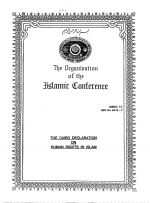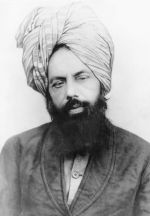Portal: Modern Movements in Islam
A plethora of modern religious, social, political, and intellectual movements have primarily defined themselves vis-à-vis the Islamic tradition. Some of these movements have embraced the Islamic tradition wholeheartedly in an attempt at revival, others have sought vigorously to reform and reorient it, and still others have rejected it out right and sought its dismantlement. Specific examples of each include the Deobandi traditionalist movement most notably expressed through the proliferation of madrasas across the Indian subcontinent, the puritanical Salafi movement powered by Saudi Arabia evidenced by the global distribution of Darussalam publications, and finally the fast-spreading ex-Muslim movements across the world iconized by the ongoing establishment of ex-Muslim councils in countries as diverse as Pakistan, Iran, Jordan, Britain, Norway, Jordan, America, Canada, Morocco, and many others.[1] While this last variety of movement - that is, those that define themselves against Islam - is perhaps not best described as a 'movement in Islam', it shares in common with the former varieties the fact that a particular, largely new-found relationship with the Islamic tradition comprises its essence, and thus can reasonably be grouped alongside them.
The lineage of all of today's movements in one way or another can be traced through the History of Islamic Thought.
Traditionalism
The Islamic tradition has as its essence the legal interpretive methodologies of the mainstream schools of Islamic law. It is a defense and prioritization of any or one of these methodologies against attempts at reforms that traditionalist movements in the Islamic world have in common. While the various interpretive schools within the tradition have been and continue to have reasons to be cooperative, their internal dialogue is also not without its conflicts.
Other articles in this section
Salafism
Salafism is a broad umbrella term for Islamic movements which conceive of themselves against the later, historical Islamic legal tradition as harkening back to the purer form of Islam found directly in the texts of the scriptures. Thus, while salafi movements hold in common their supreme elevation of what are the same scriptures, they are also far more internally diverse and disconcodant than the traditional schools of Islamic law, for the various salafi movements have no basic approach to scriptural interpretation that they can be said to hold in common - that is, beyond a shared contempt for the traditional schools developed over hundreds of years. In this sense, the difference between Salafis and traditionalists in Islam is usefully compared to the difference between Protestants and Catholics/Orthodox Christians in Christianity.
Other articles in this section
Modernism
Modernist movements, while comprising a very small minority of intellectuals engaged in Islamic thought, distinguish themselves in a clear fashion from traditionalists and Salafis. Modernist movements share in common a straightforward acknowledgement, often made explicitly, of the merits of modernity. These movements come in various forms - ranging everything from the introduction of new and even infallible spiritual leaders and the radical re-conception of what constitutes Islamic scriptures to the outright appropriation of critical western philosophies. What they share in common, however, is a desire to move Islam towards meeting the moral, social, legal, and even financial expectations of the modern world. To many in the Muslim world, these movements appear as contemptible concessions to the west, analogous, even, to holding the door wide open for enemies with colonial ambitions. As the 2021 edition of the widely acclaimed Muslim 500 puts it, "Islamic modernism remains popularly an object of derision and ridicule, and is scorned by traditional Muslims and fundamentalists alike".[2]
Modern dawah (Islamic evangelism)
Parallel to the purposes of the various ideological movements in Islam, the specific techniques used by evangelists of all sects have evolved with time. The most famous technique created and continued to be used by Islamic evangelists in recent times is that of the purportedly miraculous concord and prediction of modern science with and by Islamic scriptures. This evangelical technique has comprised what is perhaps the majority of Islamic evangelism in the West and continues to grow in popularity in the East.
Other articles in this section
The ex-Muslim movement
The fast-spreading ex-Muslim movements across the world is iconized by the ongoing establishment of ex-Muslim councils in countries as diverse as Pakistan, Iran, Jordan, Britain, Norway, Jordan, America, Canada, Morocco, and many others.[1] Unlike the most other movements in and about Islam in the modern world, the ex-Muslim movement apparently enjoys the advantages of unity intrinsic to all movements which are primarily oppositional in nature and lack much if any of their own ideological content. Even while there has been collaboration between religiously unaffiliated ex-Muslims, ex-Muslim converts to Christianity, and critics of Islam from various faiths, however, that the largest part of the ex-Muslim movement identifies as part of the broader anti-religion, atheist, and agnostic movement spreading through the world can result in a slight, albeit by no means mutually exclusive, divergence of interests with groups and figures who identify with non-Islamic faiths.
Other articles in this section
Other movements
Other movements in and about Islam in the modern world include everything from new religious sects founded around charismatic spiritual leaders to highly political movements in Western and especially European nations that have adopted explicitly anti-Jihadist, anti-Islamic, and even anti-Muslim platforms.
Other articles in this section
References
- ↑ 1.0 1.1 International Coalition of Ex-Muslims
- ↑ S. Abdallah Schleifer; Tarek Algawhary; Aftab Ahmed, eds, "IIIC. Islamic Modernism", The Muslim 500 (2021 Edition ed.), Amman, Jordan: The Royal Islamic Strategic Studies Centre, p. 59, https://themuslim500.com/wp-content/uploads/2020/10/TheMuslim500-2021_Edition-low_res_20201028.pdfThe Royal Islamic Strategic Studies Centre (MABDA المركز الملكي للبحوث والدراسات الإسلامية) is an independent research entity affiliated with the Royal Aal al-Bayt Institute for Islamic Thought. The Royal Aal al-Bayt Institute for Islamic Thought is an international Islamic non-governmental, independent institute headquartered in Amman, the capital of the Hashemite Kingdom of Jordan.












